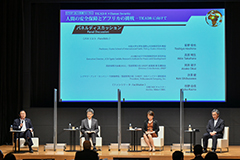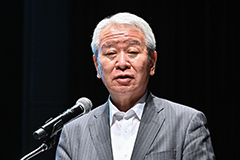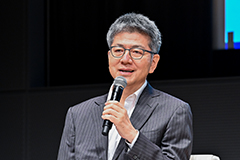Discussion at the UNDP-JICA Special Forum for TICAD8: What Roles Can Human Security Play in Africa Confronted by a Complicated Set of Multiple Crises?
2022.09.21
On July 13, 2022, the UNDP-JICA Special Forum “Human Security and Africa's Challenges: Toward TICAD8” was hosted by Nikkei. Active discussion took place on the significance and potential of the concept of human security in the current global turmoil and toward the Eighth Tokyo International Conference on African Development (TICAD8), which was held in Tunisia in August.
The forum opened with remarks from Takemi Keizo, a member of the House of Councillors of Japan who co-chaired the High-Level Advisory Panel of Eminent Experts for the 2022 Special Report on Human Security by the United Nations Development Programme (UNDP), and Hayashi Yoshimasa, Minister for Foreign Affairs of Japan.

Discussion focuses on the potential of the concept of human security in the current global turmoil
Keynote lectures by Achim Steiner, administrator of UNDP, and Tanaka Akihiko, president of JICA, followed. Steiner said that we are now in the Anthropocene, a period in which the pressure on our planet from climate change and biodiversity loss is inevitable and human security is threatened regardless of whether a country is developed or developing. He pointed out that we need solidarity, not in the sense of charity but in the sense of recognizing that in a world where climate change and viruses pay no heed to borders or boundaries, more attention has to be paid to the security of our neighbors if we are to tackle the intertwined threats we face now. Steiner emphasized that people are divided and full of distrust but we have no time to lose.
Tanaka said that it is 30 years since the concept of human security was propounded but people’s lives, livelihoods and dignity are in an unprecedented crisis. He pointed out that with around 30 million people having slipped into poverty because of the COVID-19 pandemic and the Ukraine crisis intensifying food insecurity, new threats are piling on top of already vulnerable political/socioeconomic structures and Africa is in danger of falling into a vicious cycle of crises. Upon noting that the perspective of human security is effective in addressing such complex threats, Tanaka grouped these threats into three different systems: 1) physical (e.g., earthquakes and tsunamis); 2) life (e.g., infectious diseases and starvation); and 3) social (e.g., armed conflicts and systemic poverty). He explained the importance of considering measures that could be applied across threats that interact with one another. Tanaka then stated that collaboration regardless of field or challenge, as well as solidarity among nations, international organizations, the private sector and civil society, is necessary.

Tanaka Akihiko, president of JICA, gives a keynote speech
Moreover, Tanaka noted that human security is a concept that underlies the Sustainable Development Goals (SDGs). He stressed its significance, adding that the publication of the 2022 Special Report on Human Security in February 2022 by UNDP and the launch of the flagship report series “Human Security Today,” by JICA Ogata Sadako Research Institute for Peace and Development (JICA Ogata Research Institute), in March 2022, are indeed symbolic. He then talked about “Human Security and Development Cooperation Today,” a chapter in the report by JICA Ogata Research Institute, and introduced the three transformations that would be key to future development cooperation: first, transformation in the form of “creating shared value” (CSV) in which businesses both pursue profit and give back to society; second, digital transformation, which leverages the positive aspects of digital technologies in development cooperation, such as leapfrogging that allows for new technologies to spread at one go in developing countries; and third, global governance transformation, which promotes solidarity among international organizations, national governments and non-state actors like NGOs and companies. Tanaka concluded that the progress in achieving the SDGs in Japan, Africa and around the world is seeing stagnation because of complex threats, but with human security, we can put this back on track to recovery. He said that JICA would like to play a big role in implementing this as a catalyst for all actors involved and expressed his hope for the discussion in this forum to serve as the first step for TICAD8.
During the panel discussion, each panelist commented on the challenges and threats around human security today from his/her position. The panel consisted of Hoshino Toshiya, professor at the Osaka School of International Public Policy, Osaka University, Takahara Akio, executive director of JICA Ogata Research Institute, Okai Asako, UN assistant secretary-general (also the director of the UNDP Crisis Bureau), and Shibusawa Ken, CEO of Shibusawa and Company. They discussed a wide range of topics including the implementation of human security and the possibility of impact investing through public-private partnerships in Africa. Takahara noted that human security is an idea to connect us together so that all actors involved in development cooperation can work hand in hand from equal positions while maintaining dignity. He then commented that it is crucial that human security, an idea that enables us to empathize with each other, human to human, and connect with one another, is shared as the basis of our activities.

Takahara Akio, executive director of JICA Ogata Research Institute, takes part in a panel discussion
The forum was closed with remarks from Kondo Tetsuo, director of the UNDP Representation Office in Tokyo.

事業事前評価表(地球規模課題対応国際科学技術協力(SATREPS)).国際協力機構 地球環境部 . 防災第一チーム. 1.案件名.国 名: フィリピン共和国.

事業事前評価表(地球規模課題対応国際科学技術協力(SATREPS)).国際協力機構 地球環境部 . 防災第一チーム. 1.案件名.国 名: フィリピン共和国.

事業事前評価表(地球規模課題対応国際科学技術協力(SATREPS)).国際協力機構 地球環境部 . 防災第一チーム. 1.案件名.国 名: フィリピン共和国.

事業事前評価表(地球規模課題対応国際科学技術協力(SATREPS)).国際協力機構 地球環境部 . 防災第一チーム. 1.案件名.国 名: フィリピン共和国.

事業事前評価表(地球規模課題対応国際科学技術協力(SATREPS)).国際協力機構 地球環境部 . 防災第一チーム. 1.案件名.国 名: フィリピン共和国.
scroll